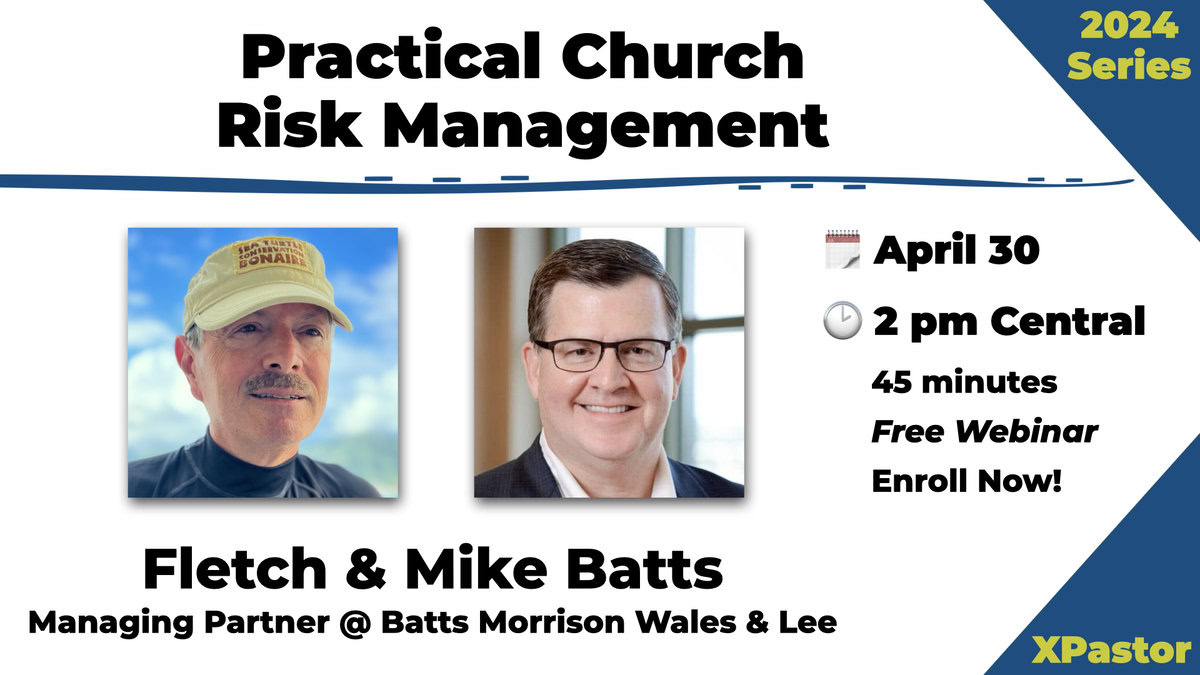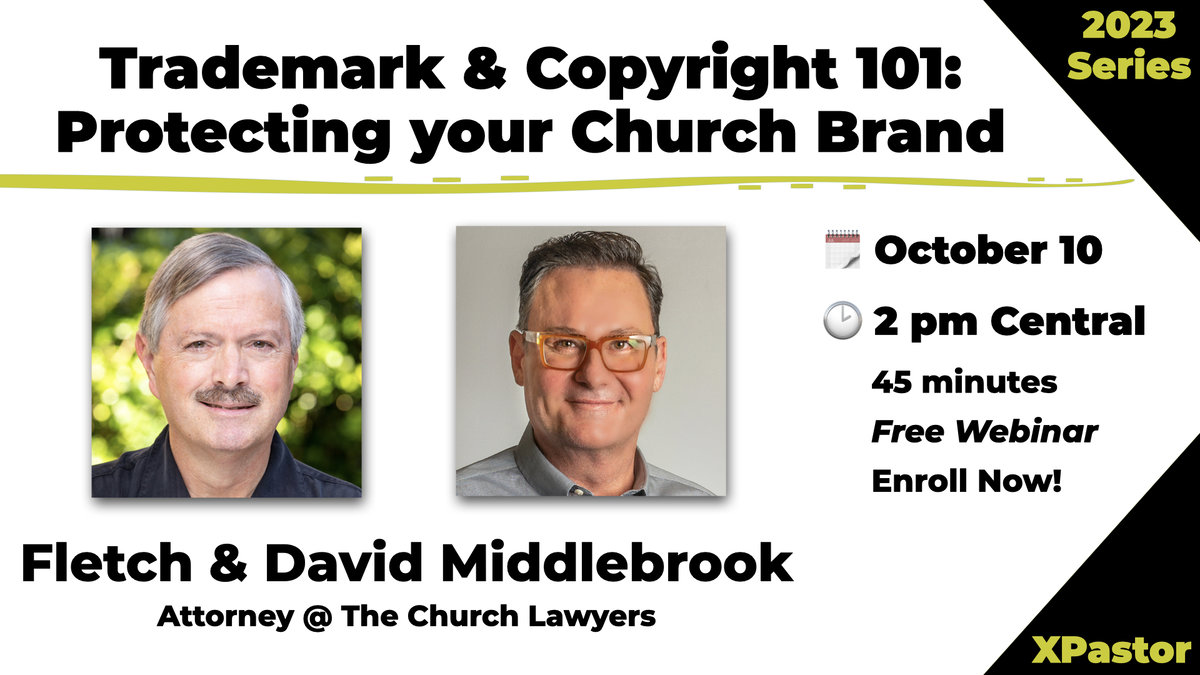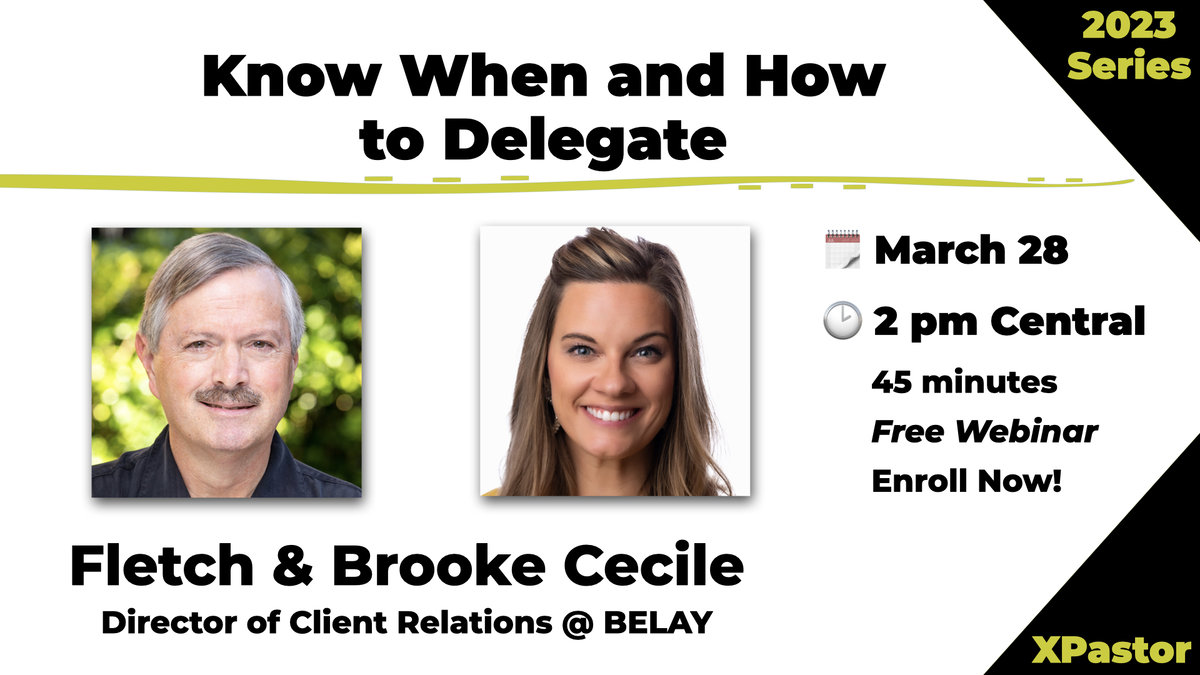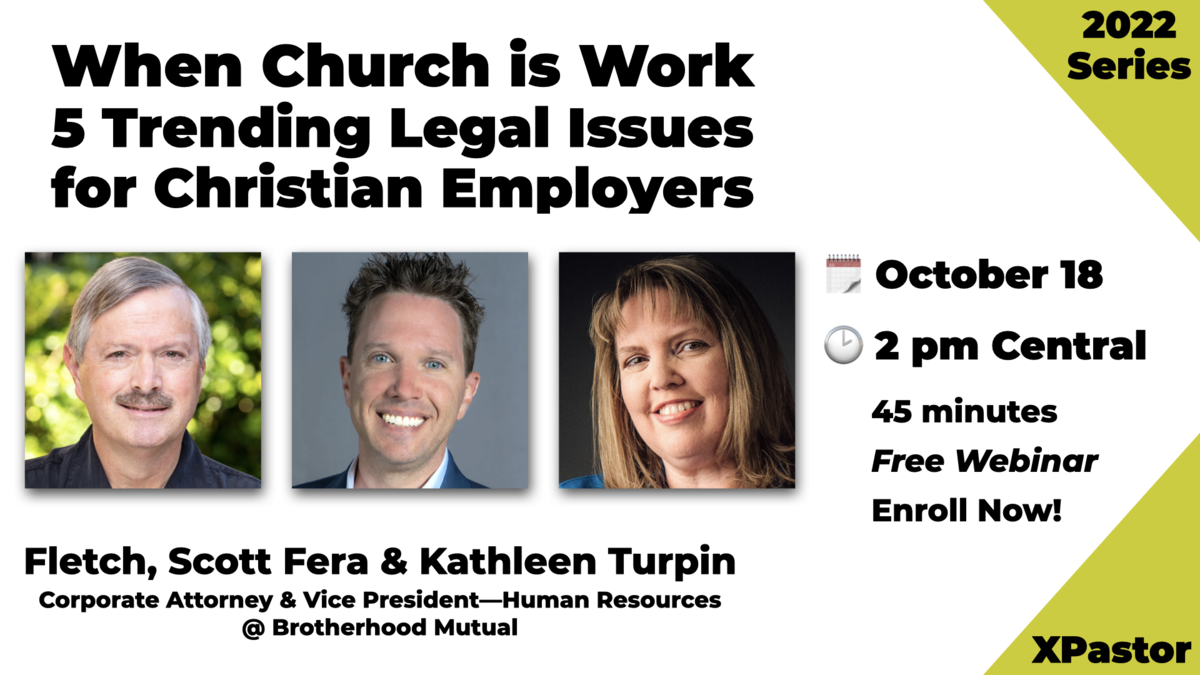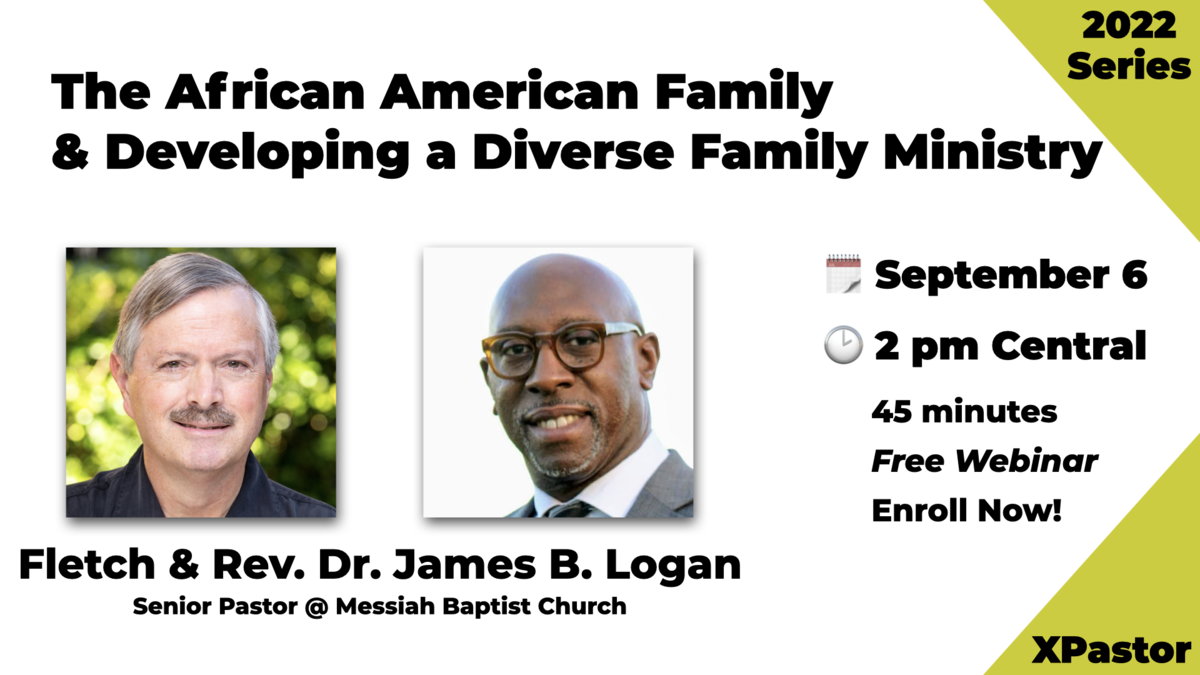XPastor tries to help churches by providing some of the essentials for running a church—items like job descriptions, employment applications, review forms and policies. Below is the Intellectual Property Policy of Christ Community Church of Chicago.
Intellectual Property Policy Objective
The primary purpose of this intellectual property policy is to provide the necessary protections and incentives to encourage both the development of tools that promote the Mission and the dissemination of these tools for the public benefit to the body of Christ.
Publishing Mission
We believe God has entrusted Christ Community Church (hereinafter, “CCC”) with the privilege and responsibility to help fulfill God’s desires to Make Disciples of Jesus Christ Who Are Belonging, Growing, Serving and Reaching (the “Mission”). As we further Christ’s Kingdom in our midst, we also believe, in obedience to His Great Commission, that we are to labor to extend His Kingdom worldwide.
God has blessed CCC with a veritable fountain of teaching, administration and artistic resources and we believe God’s intent is that we serve the church of Christ locally, regionally and worldwide making these resources available.
To that end, CCC endeavors:
- To equip, train and deploy members of the body of Christ in the creative publishing of God’s truth in all appropriate media to fulfill God’s desire to create fully devoted followers of Christ; and
- To instruct, guide, inspire, counsel, teach, and train through a variety of methodologies, resulting in the creation of spiritually edifying intellectual property assets (hereinafter, “Assets” or “Resources”) that are disseminated in a variety of formats (e.g. sermons, scripts, songs, books, curriculum, software, business methods and systems that are set forth in print media, video, audio, software web-based tools, etc.); and
- To provide all members of the body of Christ associated with CCC the privilege and opportunity to serve God through the creation of spiritually edifying intellectual property resources using the talents, spiritual gifts and abilities with which God has uniquely equipped them; and
- To attract, retain and sustain like-minded individuals who desire to enhance the Mission and who add value to the intellectual property asset base; and
- To multiply the Kingdom impact in serving the body of Christ and other churches through the dissemination of resources that further the Mission; and
- To offer like-minded individuals, who may or may not be employed by or related to CCC, an opportunity to contribute to and be identified with the Mission in their publishing endeavors.
Publishing Values
We believe that CCC has spiritual responsibility for the stewardship of God’s resources created by its employees, and therefore seeks to enhance and maximize the use of those resources for the CCC community and the greater Christian community (John 15:1-5; Luke 19:11-24; Matt. 28:19-20).
We desire to honor and reward each and every individual employee’s contribution to the creation of these resources and fairly compensate them out of the sales from the products. We recognize that God has indeed gifted some specific individuals in our community to be writers, teachers and creative communicators and we believe that these gifted persons should receive appropriate, additional compensation for serving as the voice of this blessing, subject to any legal requirements for the compensation of employees of tax-exempt organizations (Luke 10:7, 1 Tim. 5:18).
We believe that both the individual and the community are strengthened by each other in the individual’s employment. We recognize that everyone brings their own unique life experiences, educational investment and other talents to their employment at CCC. At the same time, it is also true that their character and gifts are sharpened and strengthened as they serve and grow in their ministry on staff at Christ Community Church (1 Cor. 12:12-21; Prov. 27:17).
Rights and Ownership
Copyrightable works, inventions, discoveries and other creative works that have the potential to be brought into practical use for the purposes of the Mission will be regularly derived from the activities of Christ Community Church employees in the course of their employment duties or through the use, by any person, of Christ Community Church such as equipment, facilities, funds or personnel (including volunteers), and the activities of employees who create such works outside the scope of employment.
CCC Copyright Ownership. CCC will own the copyrights to Intellectual Property work created by a CCC employee within the scope of his/her employment duties. In the typical work-for-hire situation, the content and purpose of the employee-prepared works are under the control and direction of the employer; and the employee is accountable to the employer for the content and design of the work. In addition, there may be other situations where CCC owns the copyright to an employee work that otherwise would have fallen under the general policy stated in Section 4.2 (e.g. specifically commissioned works, contractual works, works that use substantial CCC resources, such as equipment and staff support/expertise). It should be noted, however, that even within these guidelines, CCC can elect to waive its right for Copyright Ownership, provided it is outlined in writing and authorized in the manner noted in Section 4.2.
CCC Employee Copyright Ownership. Except in the manner detailed above in Section 4.1., or in any situation that would contradict the legal requirements for tax exempt organizations, individual CCC employees will have copyrights ownership to all Intellectual Property, including traditional church-based copyrightable works (such as sermons, songs, drama scripts, curricula, books and Bible studies) that are created independently and at the employee’s initiative. In any and every situation where a CCC employee seeks, is granted and accepts copyright ownership, the following rules and conditions must be met and apply in full, in addition to any other requirements detailed within this policy:
- The copyright proposal must be completed, signed and dated by the employee. Proposals must be submitted in writing and must include information on:
- The purpose of the project
- The projected time the project will take to complete
- The amount of Christ Community’s time that will be spent on the project
- The extent that CCC owned resources will be utilized for the creation and support of the project
- How the project will benefit Christ Community
- How the project will benefit the Kingdom at large
- Collaborations with CCC staff, lay people or volunteers
- The copyright ownership detailed in the proposal must fall within all acceptable guidelines and laws for tax exempt organizations.
- When CCC staff time or CCC owned resources are utilized for the creation and/or support of Employee Owned Copyrighted Assets, the fair market value of this support will be assessed and billed to the employee.
- Staff members are personally responsible for reporting monetary gains for proceeds and revenues received from their copyright ownership on their income taxes.
- Information that is proprietary to Christ Community Church cannot be shared, either with or without fee, with any outside organization or individual unless express written permission is first received from the Executive Pastor and Trustee Chairperson.
- If the collaboration is a split effort involving multiple staff members doing significant portions of work, percentages for remuneration must be worked out ahead of time.
- If, after the initial approval process, the project changes in either scope or time required, these changes must be communicated to and approved by the Executive Pastor. The Executive Pastor has the right to deny the request or place a limit on the amount of Christ Community time that can be allotted for the project.
- The Executive Pastor may refuse the proposal after considering how it will impact the employee, his/her respective ministry, and the church at large. If the proposal is approved, the Executive Pastor may establish clear time and energy parameters for the project to protect the health of the church and employee. Since Ministry staff are required to be on campus for a specific number of weekend services per year, outside projects will likely need to be scheduled during weekends off.
- To be considered approved, the proposal must be signed by the Executive Pastor and approved in writing by the Elder Team. In the event that the Executive Pastor is the employee seeking copyright ownership, the Senior Pastor must approve the proposal.
CCC Rights to Use Employee Owned Works. As a result of the employment relationship, CCC may require certain rights to be granted to CCC on a royalty-free basis to further the CCC mission. Other rights may be granted by the employee on a royalty-free basis.
Exempt Organizations law required all assets owned by CCC, including intellectual property and other tangible assets, be used only to further exempt purposes, and not for private benefit. When CCC provides payments to employees for works created within the scope of employment, payments must be made in accordance with applicable laws and regulations governing compensation to employees.
Application of Policy to Staff and Volunteers
This Intellectual Property Policy, as amended from time to time, shall be deemed a part of the conditions of employment for every employee of CCC. All employees (whether full or part time, hourly or salaried, seasonal or employees on leave) who receive funds from CCC in the form of salary, wages, stipend or other support are bound by this policy. As a condition of employment, all employees agree to the terms and conditions of this policy, including any grant or license of rights, as applicable to all works created by the employee during the term of employment.
It is also the policy of CCC that individuals (including volunteers) be participating in a sponsored CCC project and/or making significant use of CCC-administered resources thereby accept the principles of ownership of Intellectual Property as stated in this policy unless an exception is approved in writing by CCC.
All Originators of Intellectual Property shall executive appropriate assignment, license, and/or other documents as required from time to time to effectively set forth ownership and rights as specified in this policy. The absence of any formal agreements shall not invalidate the applicability of this Intellectual Property Policy.
Definitions
Intellectual Property. The term “intellectual property” as used herein is broadly defined to include inventions, discoveries, know-how, processes, copyrightable works, technology, original data and other creative or artistic works, original data and other creative or artistic works which have value. Intellectual property includes that which is protectable by statute or legislation, such as patents, copyrights, trademarks, service marks, trade secrets and trade dress. It also includes the physical embodiments of intellectual and spiritual effort, for example, printed matter (such as books, sermons, pamphlets, lyrics, scripts), art, musical compositions, choreography, software and electronic goods such as CDs, audiotapes, videotapes, DVDs, CD-Roms, etc.
Traditional Church-based Copyrightable Works. “Traditional church-based copyrightable works” are a subset of copyrightable works created independently and at the Author/Originator’s initiative for traditional church purposes. Examples include class notes, books, sermons, course syllabi, manuals, Bible studies, discipleship training seminars, educational software, articles, non-fiction, fiction, Bible-stories, Bible curriculum, school curriculum, poems, psalms, hymns, spiritual songs, musical works, dramatic works including any accompanying music, pantomimes and choreographed works, pictorials, graphic and sculptural works, or other works of artistic imagination that are not created as an institutional initiative (as defined below).
Author/Originator. “Author/Originator” refers to an individual or group of individuals who make, conceive, reduce to practice, author, or otherwise make a substantive intellectual contribution to the creation of Intellectual Property. “Author/Originator” includes the definition of “inventor” used in U.S. patent law and the definition of “author” used in the U.S. Copyright Act.
Church Resources Usually and Customarily Provided. When determining ownership and license rights in copyrightable works, CCC resources “usually and customarily provided” includes such ancillary support as office space, telephones, and ordinary access to computers and networks. In general, it does not include the use of employees as support staff to develop the work, substantial use of volunteer networks for testing or other purposes, or substantial use of specialized or unique facilities and equipment provided by CCC unless approved as an exception.
Examples might include situations where Author/Originator’s use CCC-provided facilities and resources in the creation of works for artistic imagination, for example, use of high end computer hardware and software in the creation of artistic graphical image; studio recording equipment, etc.
Copyrights
Copyright Ownership
Ownership By Author/Originator. Unless subject to any of the exceptions specified below in 7.1.2, Author/Originator shall retain copyright ownership to traditional church-based copyrightable works as defined in Section 6.2 above.
Ownership By CCC. CCC shall own copyrightable works as follows:
- Works created as a specific requirement of employment or as an assigned CCC duty that may be specified, for example, in a written job description, performance goals or an employment agreement. Such specification may define the full scope or content of the employee’s employment duties comprehensively or may be limited to terms applicable to a single copyrightable work. Absent such prior written specification, ownership will vest with CCC in those cases where CCC provides the motivation for the preparation or the work, the work is the type of work the employee is employed to perform, and when the work is prepared at CCC’s expense.
- Works specifically commissioned by CCC. The term “commissioned work” is hereinafter used to describe a copyrightable work prepared under a written agreement between CCC and the Author/Originator when (1) the Author/Originator is not a CCC employee, or (2) the Author/Originator is a CCC employee but the work performed falls outside the normal scope of the Author/Originator’s employment role/responsibilities. Contracts covering commissioned works shall specify that the Author/Originator convey by assignment, if necessary, such rights as are required by CCC.
- Works that were created by an employee outside of the scope of his or her employment, but using substantial resources of CCC and where the fair market value of such resources was not reimbursed to CCC by the employee.
CCC Rights in Author/Originator-Owned Works
Works Created with No Use or Minimal Use of CCC Resources. Traditional church-based copyrightable works created that make no or minimal use of CCC resources, as further defined in Section 7.1.1 and created outside the scope of the employment duties of the Author/Originator, are owned exclusively by the Author/Originator.
Works Created with Significant Use of CCC Resources. Traditional church-based copyrightable works created with use of CCC resources over and above those usually and customarily provided shall be owned by the Author/Originator. In addition, CCC shall determine on a case-by-case basis whether CCC shall retain an ownership interest in the exploitation of the works or whether the Author/Originator shall reimburse CCC for the fair market value of the CCC resources used by the Author/Originator to create the works.
Rights Granted to CCC. Notwithstanding anything to the contrary above, and regardless of the amount of CCC resources used by the Author/Originator, Author/Originator grants to CCC: (a) the rights set forth at Exhibit 1, to be exercised by CCC in its sole discretion, and (b) a First Right of Negotiation, exercised as set forth in Section 7.2.4 with respect to the licensing, publishing, distribution, promotion and advertisement, marketing and sale of the work(s) in print/and or various media, for sale in all channels of distribution throughout the world. Author/Originator agrees to reserve for CCC’s benefit the rights granted to CCC in this Intellectual Property Policy.
Right of First Negotiation. Author/Originator grants to CCC or CCC licensee an exclusive right of first negotiation (the ‘First Negotiation Right’) to license, publish, distribute, advertise, publicize, market and sell any work created pursuant to Section 7.1.1 in print and/or other various media, for sale in all channels of distribution throughout the world. Author/Originator agrees to negotiate in good faith with CCC or CCC’s licensee.
The First Negotiation Right shall be exercised by CCC or CCC licensee as follows:
- If Author/Originator desires to license or transfer the rights referenced above with respect to any work of Author/Originator, then Author/Originator shall complete CCC or CCC’s licensee’s formal intake (See Exhibit 2 for a sample form) and meet with CCC or CCC’s licensee’s publishing/production team, as established by the Executive Pastor.
- CCC or CCC’s licensee shall thereafter have sixty (60) days from the date of such activity, unless otherwise mutually agreed upon (the “First Negotiation Period”) to determine if the work is within the scope of its Mission, and if it has any interest in licensing the rights to the work, and to negotiate and enter into a written agreement (the “Agreement”) with the Author/Originator. If CCC and CCC’s licensee determines that it does not desire to license the work or that it is not within the scope of its Mission, then the Author/Originator shall be free to negotiate with and conclude an agreement with any third party.
- If CCC determines that is does desire to work, and the parties fail to enter into an Agreement with respect to such work during the First Negotiation Period, then Author/Originator shall be free to negotiate with and conclude an agreement with any third party with respect to the rights that are incorporated in the First Negotiation Right provided, that with respect to the work, Author/Originator shall grant CCC a fourteen (14) day period (the “Last Refusal Period”) within which to enter into an Agreement with the Author/Originator on the same terms and conditions contained in the third party offer (the “Last Refusal Right”). Author/Originator agrees to provide copies of any bona fide third party offer to CCC concurrent with the notices of such third party offer.
Copyright Registration and Notice. CCC works should be protected by copyright notice. Such copyright notice should be composed and affixed in accordance with the United States Copyright Law. Registration of the copyrights for CCC-owned works shall be in accordance with the operational guidelines established by CCC. CCC may also decide to release work to the public domain and, if so, should so indicate.
Royalty Payments. When CCC sells any products developed from CCC-owned works, or products developed pursuant to the license granted to CCC by Author/Originator in Section 7.2.3:
- No royalties will be paid to any Author/Originator for products sold, used or distributed through channels primarily targeted to the CCC local and regional congregations in connection with CCC’s internally administered programs. Examples include, but are limited to, works distributed or sold through CCC’s bookstore or website.
- When products are sold, used or distributed through channels primary targeted to customers beyond CCC’s local and regional congregations, CCC shall pay Author/Originator a royalty set forth in Section 7.
Proceeds Distribution
When CCC determines to license, publish, transfer or otherwise exploit any CCC owned or licensed intellectual property, it may receive proceeds for such activities. CCC has determined to share proceeds with its employees as follows:
Proceeds. For purposes of this policy, “proceeds” shall refer to all revenue received by CCC from license, publication, transfer, commercialization, or other exploitation of CCC-owned intellectual property.
Revenue Distribution. When revenue is received by CCC, the revenue will be distributed as follows:
CCC and CCC Licensee Share. CCC and/or CCC licensee will retain a percentage of revenue based on its investment in the development, editorial, marketing and distribution of the work.
- CCC Licensee Share. CCC shall pay CCC Licensee for any and all services related to the administration of this Intellectual Property Policy and development of its intellectual property resources, and
- CCC Share. The net income after deducting the CCC Licensee Share shall be allocated as set forth in Exhibit 3 in support of its charitable, religious and education program, as determined by the Elder Team. Such programs may include: staff development, research and development, benevolence fund, and for local and international outreach ministries.
- Author/Originator Payment. The net income after deducting the CCC Share will be paid out to the Author/Originator(s), as governed by legal requirements for the payment of reasonable compensation required of tax-exempt employers.
Special Distributions. Special facts or circumstances may warrant a different distribution of the proceeds than is specific above, and such distributions will be determined in a case-by-case basis under the authority of the Elder Team.
Trademarks
Trademarks and service marks are distinctive works or graphic symbols identifying the source, product, producer, or distributor of goods or services. Registration and use of CCC appropriate trademarks or service marks, at the state or federal level, shall be approved by the appropriate CCC official. Proceeds derived from commercialization and use of a mark used on a work subject to this Intellectual Property Policy shall inure the sole and exclusive benefit of CCC. No use of any federal or state registered mark or any common law mark owned by CCC shall be made by any employee without the prior written approval of CCC.
Intellectual Property Administration
Administrative Responsibility. The Elders of CCC have the ultimate authority for the stewardship of intellectual property developed at CCC. The elders will establish and approve operational guidelines and procedures for the administration of intellectual property, including but not limited to determination of ownership, assignment, protection, licensing, marketing, maintenance of records, oversight of revenue or equity collection and distribution, approval of individual exceptions, and resolution of disputes among Authors/Originators.
Evaluation and Exploitation Decisions. In its sole discretion, CCC or its authorized agent, may develop the intellectual property work through licensing, may release it to the Author/Originator if permitted by law, or may take such other actions as are determined to be in the public interest. Exploitation by CCC may or may not involve statutory protection of the intellectual property rights, such as registering the copyright.
Questions Related to CCC Ownership. In the event there is a question as to whether CCC has a valid ownership claim in intellectual property, such intellectual property should be disclosed in writing to CCC by the Author/Originator. Such disclosure is without prejudice to the Author/Originators ownership claim. CCC will provide the Author/Originators with a written statement as to CCC’s ownership interest.
CCC Abandons Intellectual Property. Should CCC decide to abandon development or protection of a CCC-owned intellectual property, ownership may be assigned to the Author/Originator subject to the retention of a license to use the intellectual property for purposes set forth in Exhibit 1 and/or payment from the Author/Originator, as required by law.
Statement By Author/Originator. The Author/Originator of intellectual property owned by CCC under the terms of this policy shall agree that to the best of their knowledge the intellectual property does not infringe on any existing patent, copyright, or other legal right(s) of any third party, including rights that are owned by CCC; that if the work is not the original expression or creation of the Author/Originator, the necessary permission for use has been obtained from the owner; and that the work contains no libelous materials nor material that invades the privacy of others.
Exceptions to Policy. Recommendations for exceptions to the provision of the Intellectual Property Policy shall be made by the Elder Team.
For readability, this document was edited for the web, deleting Section numbers. View original PDF: Intellectual Property Policy


